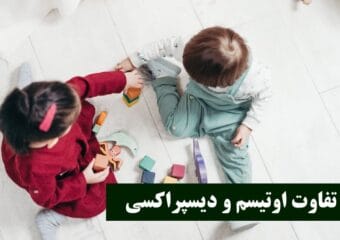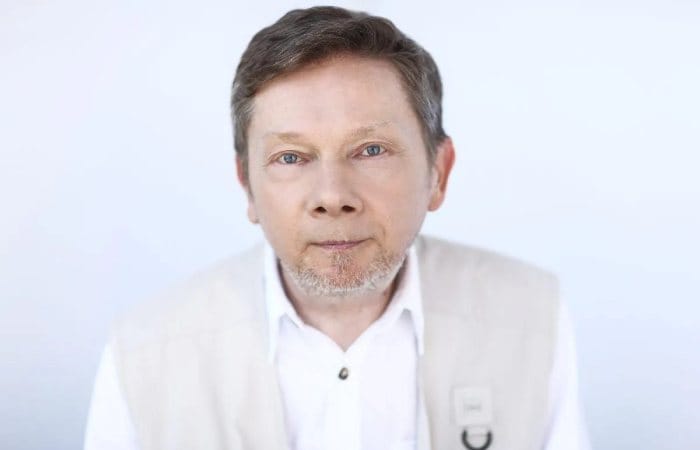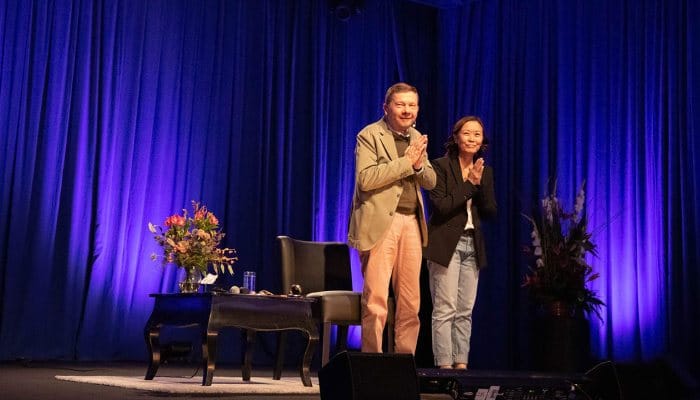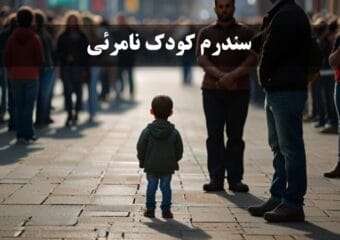
Blog
Eckhart Tolle

In the modern world, the concept of the ego or self has become one of the central topics in psychology and philosophy. Eckhart Tolle, a contemporary author and thinker, has delved deeply into this concept and presents it as a determining factor in human experience. In his works, particularly in the book The Power of Now, he examines how the ego impacts daily life and human relationships. This article aims to explore Eckhart Tolle’s views on the ego and its influence on our lives.
فهرست عناوین
ToggleEckhart Tolle’s Biography
Eckhart Tolle, a well-known author and speaker in the fields of personal development and spirituality, was born on February 16, 1948, in Germany. In his youth, he studied various subjects, including languages and literature, but during his studies, he experienced dissatisfaction and confusion. At the age of 29, Eckhart underwent a profound spiritual and psychological crisis. He went through intense feelings of loneliness and despair.
This crisis led to a deep spiritual experience that guided him to an awareness of the present moment and his own being. He refers to this experience as the “moment of awakening.” After his spiritual awakening, Tolle moved to the United Kingdom, where he began teaching and offering counseling. Eckhart Tolle is recognized as an international speaker and has participated in conferences and television programs. His works have had a significant impact on the contemporary self-help and spiritual culture.
Eckhart Tolle currently resides in Vancouver, Canada, where he continues to teach and write. One of the central themes of his teachings is the importance of living in the present moment and freeing oneself from mental burdens.

What is the Ego and How is it Created?
The ego, as a self-constructed identity, represents a collection of individual beliefs and perceptions through which a person understands themselves and their place in the world. This concept encompasses personality, talents, interests, and desires, and generally refers to the way an individual interacts with their surroundings. The ego can act as a determining factor in our behaviors and decisions. However, in some cases, the ego may trap an individual in a cycle of issues and challenges, preventing them from growth and progress. Therefore, understanding and managing the ego is crucial for a person to achieve a more meaningful and balanced life.
Many individuals become trapped in cycles of worthlessness and routine, with one of the primary reasons being a strong attachment to the “ego” or self-image. This ego, which is largely shaped by the stories an individual constructs about themselves, can distance them from the reality of the present moment. In other words, the ego, as a social and personal identity, is reinforced through the narratives we create for ourselves. Every human being constructs stories throughout their life that not only affect their identity but may also lead to cognitive and emotional limitations.
A question that might arise is: what is the problem with this storytelling? The main issue lies in the fact that these stories are unable to create reality and bring about actual change. Stories are merely narratives that cannot, by themselves, lead to positive transformations in a person’s life. As a result, awareness of this fact and striving to transcend the limitations of the ego can help a person break free from cycles of worthlessness and achieve a meaningful life.
Suggested article: Love from Stenberg’s Perspective
Eckhart Tolle’s View on the Ego
Eckhart Tolle believes that one of the best ways to understand an individual’s ego is by analyzing matters related to their possessions and wealth. In other words, what a person considers as their wealth and the activities they engage in to acquire it can provide valuable insights into their ego.
To gain a deeper understanding of an individual’s ego, or one’s own ego, it is necessary to consider various aspects, including education, knowledge, and even the physical appearance of the person. Identifying the unique abilities of each individual can also help us gain a better understanding of their ego.
In addition, social relationships and a person’s life history can reveal important clues about their ego. According to Eckhart Tolle, focusing on individuals’ belief systems and even emotions such as patriotism can help us understand their ego. The ego is just one aspect of the human condition and cannot, by itself, represent the true essence of a person’s existence. This is because, when the ego is active, it focuses on concepts such as right and wrong, blame and shame, and even obsession. The ego acts as a judge within us, and these judgments can lead to negative feelings and psychological tensions.
In fact, the ego drives us to think in terms of “what can I gain?” rather than approaching life from the perspective of “how can I serve?” Therefore, if we can identify our ego and the inner judge, understand situations related to them, and strive to avoid the traps the ego sets for us, the path of our lives will certainly become more beautiful and meaningful.

The Influence of the Ego on Human Behavior
In this discussion, we examine the concept of the ego and its influence on human behavior. To illustrate this, we can consider a triangle with three sides, each representing an aspect that protects us from the harmful effects of the ego. Understanding the ego and how it functions can help us experience a more peaceful life.
One of the main sides of this triangle is that we must strive to let go of taking everything personally and getting upset. The ego tends to position itself as the victim. People who constantly express weakness and helplessness are usually caught in the trap of the ego.
Therefore, it is essential to remember that the ego grows in situations of pain and conflict. In contrast, love and compassion are inherent qualities of humans and can bring peace to our lives. When someone provokes you with their words, you have two options: either respond with anger and ego-driven reactions, or view the situation as an opportunity for personal growth and avoid engaging in the ego’s game. By better understanding the ego and controlling our reactions, we can experience a life of greater peace.
In the face of criticism and negative opinions, some people may try to transfer their negative emotions to others. This behavior is usually the result of inner personal struggles. Aware and clever individuals generally avoid entering these psychological games because each person’s energy is limited, and spending it on egoic conflicts only leads to wasted energy.
Furthermore, the second key factor in managing negative emotions and avoiding the traps of the ego is the ability to forgive. The ego tends to center itself in the spotlight and may even engage in seemingly positive actions. However, when someone intends to do a good deed, the ego can obstruct this goal and create paradoxes. Therefore, if an individual can cultivate the skill of forgiveness, they can avoid falling into egoic pitfalls and improve the quality of their life. In this way, forgiveness becomes one of the essential pillars of creating a healthy and balanced life.
Suggested article: Introduction to personality traits
Within every individual, there are many hidden beauties and talents. However, if these beauties are not nurtured, the weeds (ego) may gradually overshadow them.
When a person engages in forgiveness, they feel as though a flower is blooming within them. Forgiveness leads to freedom from the need for validation and being “right.” In fact, the highest form of forgiveness is self-forgiveness.
The third side that should be considered is that we must learn to let go and observe. When we focus on an issue and hold onto it tightly, we expend a lot of energy on it. But when we let go of it, there is no longer a need for constant activity.
The struggle for recognition and winning is one of the challenges humans face every day. Instead of these struggles, it is better to focus on our true selves and not waste our energy. The ego is always trying to prove itself and requires energy to do so. This energy is usually drawn from within us, and when it is depleted, feelings of emptiness and fatigue set in. Therefore, by learning to forgive and let go of attachments, we can achieve inner peace and real growth.
In the process of letting go of issues and challenges, there is no need for others’ approval. The concept of the “higher self” refers to connecting with inner emotions and love. The higher self operates independently of external factors and energies and always continues moving with positive motivation and energy.
However, the ego (the self) can block the emergence of the higher self. Self-awareness and understanding one’s existence help us realize that we need to align with and understand our true essence. Over time, we will understand that the ego, in fact, has limited utility. In other words, as we enrich ourselves from within, we develop the ability to observe phenomena without expectation. In this state, we can see things as they truly are.
Suggested article: Schemas
Ego and Awareness in Human Relationships
The goal of psychology is to help individuals manage their ego so that they can improve their quality of life and experience greater peace.
At a certain stage of personal growth and attaining the higher self, an individual gains the ability to observe others in a deeper and more genuine way. At this stage, the person is able to see others as they truly are. When we view others from the perspective of the ego, we may fail to understand their inner reality, or we may even become interested in people who are not deserving of our affection. However, upon reaching this stage, we observe others without prejudice or judgment.
When individuals reach this level of awareness, they no longer try to control others to fit their desires. Awareness of the ego allows a person to master it. Eckhart Tolle states that when you identify your ego and gain mastery over it, the ego can no longer fully dominate you. He points out that the ego is only real when we are unaware of it. Once we become aware of it, the ego reveals itself as an old, conditioned mental pattern.
The most important point is that the ego represents ignorance and can never coexist with awareness; they are always in conflict. When we achieve awareness, the ego gradually fades away. When the ego dominates our mind, we become distanced from ourselves and from reality.
برای مشاوره رایگان و رزرو وقت (یا اگر تماس گرفتید و قادر به پاسخگویی نبودیم) شماره تماس خود را وارد کنید. ما به زودی با شما تماس می گیریم!



